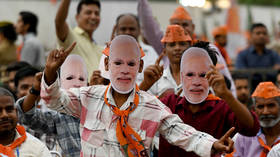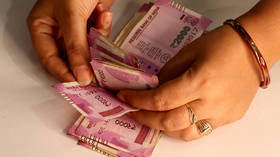End of political funding scheme pushing India towards ‘black money’ – Modi

Indian Prime Minister Narendra Modi has claimed his country is being “pushed” towards corruption after a scheme for funding political parties introduced by his government was deemed unconstitutional by the Supreme Court.
Commenting on the electoral bonds scheme for the first time since the court’s judgment in February, Modi told news agency ANI that the initiative had been a “success story” as it provided traceability in relation to political funding. However, he also admitted that there had been “a lot of scope for improvement.”
“But today we have completely pushed the country towards black money, hence I say everyone will regret it,” he said.
Modi claimed that the idea of managing political funding through bonds had arisen from a “pure thought” in his mind of how to tackle corruption in Indian politics and make it more transparent. “We found a small way, we never claimed that this was the absolute way,” he added.
The prime minister pointed out that only 26 companies out of 3,000 that donated through the scheme were investigated by law enforcement agencies. Of these 26, only 16 bought electoral bonds – and nearly two-thirds of this went to opposition parties.
However, Congress party leader Rahul Gandhi described the bonds scheme as “the biggest extortion scheme in the world,” and accused Modi of being its “mastermind,” days before India’s parliamentary elections.
“The important thing with the electoral bonds is names and dates. If you see the names and dates, you will know that, when [donors] gave the electoral bond, right after that contract was given to them or CBI [Central Bureau of Investigation] inquiry was withdrawn against them,” Gandhi said, according to India Today.
The electoral bonds scheme was introduced by Modi’s government in 2018, allowing companies and individuals to purchase bonds from the SBI and donate them to parties anonymously. At that time, the government maintained that it would help increase transparency surrounding political financing in India. In February, India’s top court scrapped the scheme, branding it “unconstitutional.” The court also asked the government-owned State Bank of India (SBI), which issued the bonds, to provide details relating to the scheme to the Election Commission of India (ECI).
These details were later made public, and suggested that the Modi-led Bharatiya Janata Party (BJP) had been the biggest beneficiary of the scheme, securing almost half of the bonds donated between 2018 and 2024, worth 60 billion rupees ($719 million).
Opposition parties also received funding through the same scheme. The country’s oldest and largest nationwide opposition party, the Congress, as well as the All India Trinamool Congress (TMC) party, which is influential in the state of West Bengal, were among the next-biggest recipients. They raked in 14 billion rupees ($167 million) and 16 billion rupees ($191 million) in donations, respectively.
Where India Meets Russia – We are now on WhatsApp! Follow and share RT India in English and in Hindi













